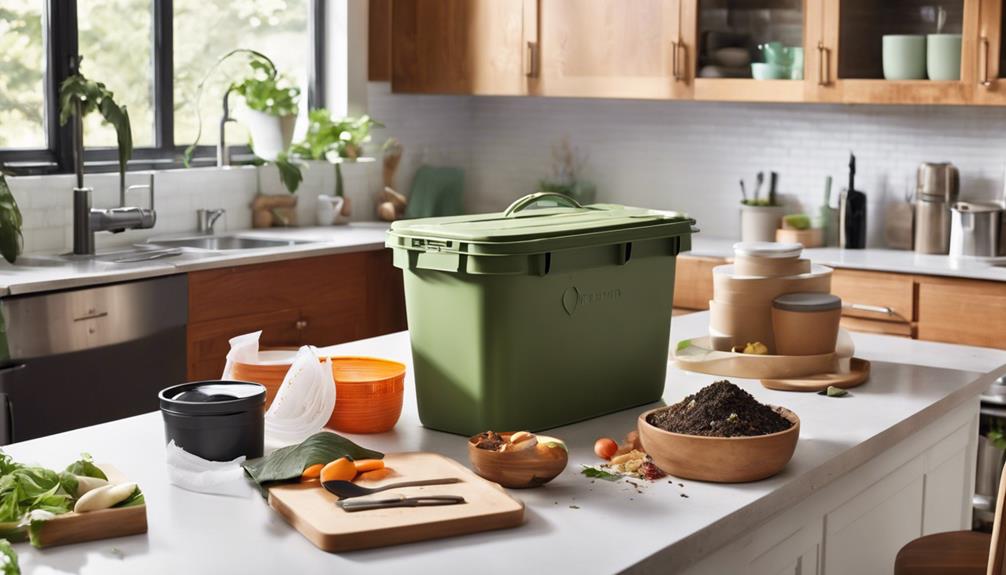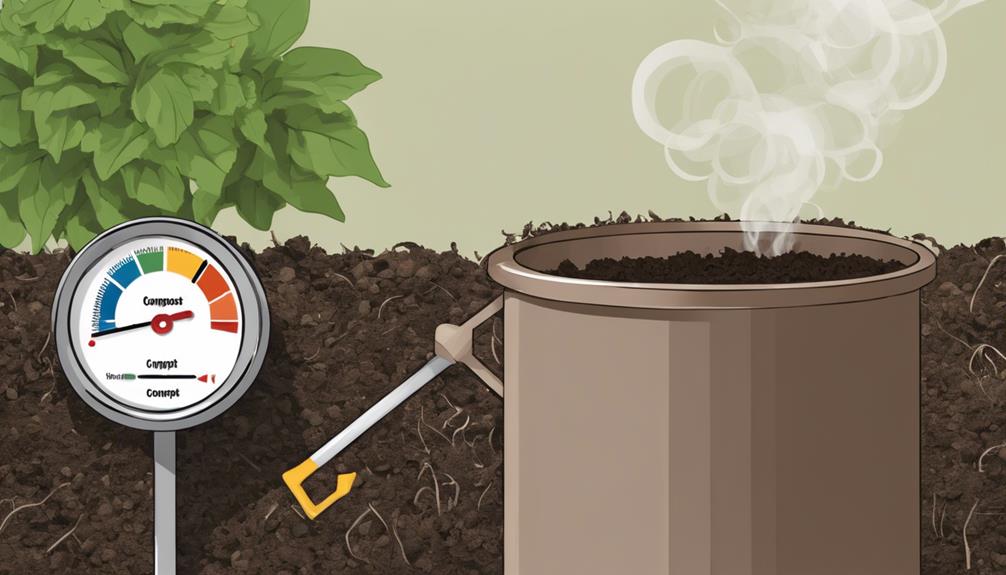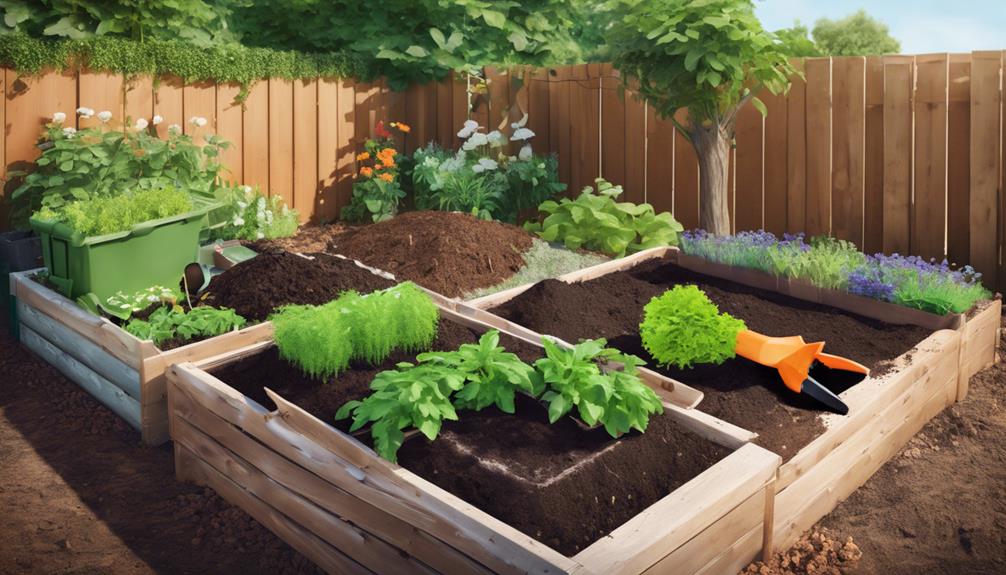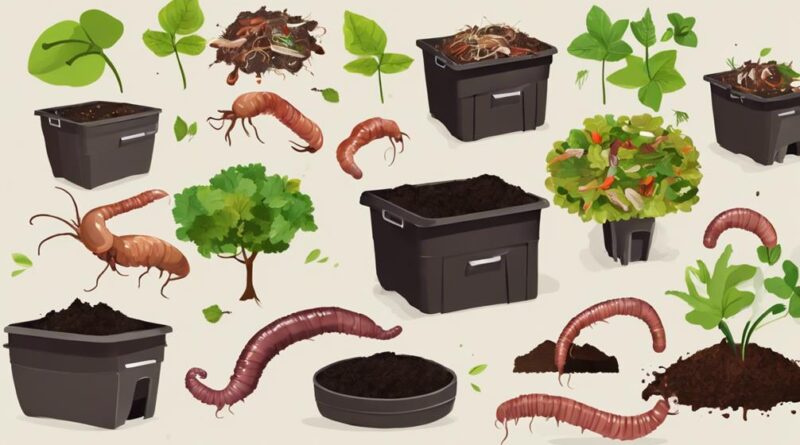12 Effective Tips to Minimize Waste via Composting
This post may contain affiliate links which means I may receive a commission for purchases made through links. As an Amazon Associate, I earn from qualifying purchases. Learn more on my Private Policy page.
Minimize waste effectively by following expert tips on composting. Choose a suitable compost bin that matches your lifestyle. Balance green and brown materials in a 2:1 ratio for optimal decomposition. Chop materials into smaller pieces to speed up breakdown. Turn the compost regularly to ensure even decomposition. Keep the compost moist by monitoring moisture levels. Utilize compostable kitchen containers to reduce waste. Consider adding earthworms for faster decomposition. Monitor compost temperature and cover it to retain heat. Incorporate compost into garden soil to enhance nutrient content. Learn more about common composting issues for successful waste reduction and nutrient-rich soil creation.
Choose the Right Compost Bin
Have you ever wondered which compost bin is best suited for your needs? When it comes to composting, selecting the right bin is crucial for effective waste management. There are various options available, each with its own set of advantages and maintenance requirements.
Firstly, consider the size of the compost bin you need. If you have limited space or only produce a small amount of kitchen waste, a compact bin or a worm composting system may be ideal. On the other hand, if you have a larger household or garden, a tumbler or rotating bin could accommodate a higher volume of organic materials.
Next, think about the material of the compost bin. Common options include plastic, wood, metal, or ceramic. Plastic bins are lightweight and easy to move around, but may not be as durable as metal or wood bins. Wooden bins blend well in garden settings and provide good insulation for the composting process. Metal bins are sturdy and long-lasting, while ceramic bins offer a stylish option for indoor composting.
When selecting a compost bin, also consider the maintenance involved. Different bins require varying levels of attention, such as turning the compost regularly, monitoring moisture levels, and adding the right balance of green and brown materials. Choose a bin that fits your lifestyle and schedule to ensure successful composting. Remember, regular maintenance is key to producing nutrient-rich compost for your plants or garden.
Balance Green and Brown Materials
Achieving the perfect balance between green and brown materials is essential for successful composting. Green materials, rich in nitrogen balance, provide protein for microorganisms, aiding in the breakdown process. Brown materials, high in carbon ratio, offer a source of energy for the microorganisms to grow and reproduce.
Here are three key points to help you achieve the ideal balance:
- Green Materials: Green materials such as fruit and vegetable scraps, grass clippings, and coffee grounds are considered nitrogen-rich. These materials help speed up the composting process by providing essential nutrients for microorganisms. Aim to include a variety of green materials in your compost pile to maintain a healthy nitrogen balance.
- Brown Materials: Brown materials like dried leaves, straw, and wood chips have a high carbon ratio. These materials help create air pockets in the compost pile, promoting airflow and preventing the pile from becoming too compact. Adding brown materials in the right proportion helps balance the carbon-nitrogen ratio, ensuring efficient decomposition.
- Balancing Act: To achieve the perfect balance, aim for a ratio of roughly 2 parts brown materials to 1 part green material by volume. Monitoring the moisture content and turning the compost regularly will help maintain the balance and create nutrient-rich compost for your garden. Remember, a balanced mix of green and brown materials is key to successful composting.
Chop Materials Into Smaller Pieces
Chopping materials into smaller pieces before adding them to your compost pile enhances the decomposition process by increasing surface area for microbial activity. When you chop materials such as kitchen scraps, yard waste, or other compostable items into smaller pieces, you're essentially creating smaller compost particles. These smaller particles have more surface area, allowing for better aeration within the compost pile.
The key to understanding the importance of compost particle size lies in its impact on composting efficiency and decomposition rate. Smaller particles encourage a faster breakdown of organic matter by providing more access points for beneficial microorganisms to do their work. This increased surface area allows for improved aeration throughout the compost pile, which is vital for the aerobic decomposition process.
Turn the Compost Pile Regularly
Turning the compost pile regularly is a fundamental practice that promotes proper aeration and encourages even decomposition of organic materials. By aerating the compost, you create an oxygen-rich environment that supports the growth of beneficial microorganisms responsible for breaking down the organic matter efficiently. This process also helps in controlling the temperature within the compost pile, ensuring that it remains within the optimal range for decomposition.
To maximize the benefits of turning your compost pile regularly, consider the following:
- Compost aerating: Turning the pile allows oxygen to penetrate the materials, preventing them from becoming compacted. This aeration facilitates aerobic decomposition, which is more efficient and less smelly compared to anaerobic decomposition that occurs in oxygen-deprived conditions.
- Temperature control: Regularly turning the compost pile helps in regulating its temperature. A well-aerated compost pile heats up evenly, promoting the activity of thermophilic microorganisms that thrive in higher temperatures. This heat accelerates the decomposition process, breaking down the materials faster.
- Even decomposition: Turning the compost pile ensures that all materials are exposed to the necessary elements for decomposition. This results in a more uniform breakdown of organic matter, producing compost that's rich in nutrients and beneficial for your plants.
Keep the Compost Moist
To maintain optimal conditions for decomposition, ensuring that the compost remains adequately moist is crucial. Moisture management plays a vital role in the composting process, as it helps create the ideal environment for microbial activity and aerobic decomposition. When the compost pile is too dry, it slows down the decomposition process, while if it's too wet, it can lead to anaerobic conditions that produce unpleasant odors.
To keep your compost moist, it's recommended to regularly check the moisture levels. The compost should feel like a damp sponge, where you can squeeze out a few drops of water but with no excess water dripping. If the compost is too dry, you can add water using a watering can to moisten it evenly. On the other hand, if it's too wet, add dry materials like leaves, straw, or shredded paper to help absorb the excess moisture.
Proper moisture management ensures that beneficial microorganisms thrive in the compost pile, breaking down organic matter effectively. This not only speeds up the composting process but also helps prevent foul odors associated with anaerobic decomposition. By maintaining the right moisture levels, you can create nutrient-rich compost for your garden while minimizing waste effectively.
Avoid Composting Meat and Dairy
Why should you refrain from composting meat and dairy products in your compost pile?
Composting meat and dairy can lead to a variety of issues that may hinder the composting process and even create unwanted odors. Here's why it's best to avoid including meat and dairy in your compost:
- Slow Decomposition: Meat and dairy products decompose at a much slower rate compared to plant-based materials. This can disrupt the balance of your compost pile and prolong the overall composting process.
- Odor Concerns: Meat and dairy can attract pests like rodents and flies due to their strong odors. By excluding these products from your compost, you can help prevent potential pest problems in your composting area.
- Nutrient Imbalance: Meat and dairy contain fats and proteins that can throw off the carbon-to-nitrogen ratio in your compost pile. This can lead to an imbalance in the nutrient content of your compost, affecting its quality as a soil amendment for your plants.
Considering these factors, it's advisable to opt for meat alternatives and incorporate more plant-based materials into your compost pile. Additionally, adopting plant-based diets not only benefits your composting efforts but also aligns with sustainable waste management practices.
Use Compostable Kitchen Containers

Avoiding meat and dairy products in your compost pile not only prevents potential issues but also opens the door to a more sustainable practice – using compostable kitchen containers can further enhance your composting process. When it comes to reducing kitchen waste and enhancing compost quality, opting for biodegradable alternatives like compostable kitchen containers is a smart choice. These containers are designed to break down easily during the composting process, reducing the overall waste that ends up in landfills.
By using compostable kitchen containers, you not only divert more waste from landfills but also contribute to the creation of nutrient-rich compost for your garden. These containers are typically made from materials like cornstarch, sugarcane fiber, or bamboo, which decompose quickly and enrich the compost with essential nutrients. Additionally, using compostable containers helps in kitchen waste reduction by providing a convenient way to collect food scraps without the need for plastic bags or other non-biodegradable materials.
Make sure to look for certifications like the Biodegradable Products Institute (BPI) certification when choosing compostable kitchen containers to ensure their effectiveness in the composting process. By incorporating these eco-friendly alternatives into your composting routine, you can take a significant step towards reducing waste and creating a more sustainable environment.
Add Earthworms to Aid Decomposition
Enhance your composting process by introducing earthworms to accelerate decomposition and enrich your compost with valuable nutrients. Earthworms are incredible decomposers that can significantly speed up the breakdown of organic matter in your compost pile. By adding earthworms to your composting system, you can create nutrient-rich soil amendments that will benefit your garden in numerous ways.
Here are three key benefits of adding earthworms to aid decomposition:
- Worm Castings: Earthworms produce nutrient-rich waste called worm castings, which are essentially worm manure. These castings are packed with beneficial microorganisms and essential nutrients that are incredibly beneficial for plant growth. By incorporating earthworms into your compost pile, you're essentially introducing a natural fertilizer to your garden.
- Soil Enrichment: The presence of earthworms in your compost helps to aerate the soil and improve its structure. As earthworms move through the compost, they create tunnels that allow air and water to penetrate the soil more easily. This aeration helps to prevent compaction and promotes healthy root growth in your plants.
- Nutrient Recycling: Earthworms have the ability to break down organic matter that would otherwise take much longer to decompose. They consume a wide range of organic materials, including kitchen scraps, yard waste, and paper products, and convert them into valuable nutrients that are released back into the soil. This nutrient recycling process helps to create a more sustainable and environmentally friendly garden ecosystem.
Monitor the Compost Temperature

To ensure optimal decomposition and efficient composting, regularly monitoring the temperature of your compost pile is crucial for gauging its progress and health. Temperature management plays a vital role in the composting process, as different microorganisms thrive at specific temperature ranges. Ideally, the temperature of your compost pile should range between 110 to 160 degrees Fahrenheit for effective decomposition. To monitor the temperature accurately, insert a long-stemmed thermometer into the center of the pile, ensuring it isn't touching the sides.
Compost aerating is essential for maintaining the right temperature. When the temperature rises above 160 degrees Fahrenheit, it can kill beneficial microorganisms. If the temperature drops below 110 degrees Fahrenheit, decomposition slows down significantly. To regulate the temperature, turn the compost pile regularly using a pitchfork or compost aerator. This helps in mixing the materials, aerating the pile, and distributing heat evenly. A well-aerated compost pile allows for proper airflow, preventing overheating and promoting decomposition.
Cover the Compost to Retain Heat
Covering your compost pile with a protective layer helps retain heat efficiently, aiding in the decomposition process and fostering a healthy environment for beneficial microorganisms. By keeping your compost pile covered, you create a warm and cozy environment that accelerates the breakdown of organic materials. Here are three key benefits of covering your compost to retain heat:
- Heat Retention: The cover acts as an insulator, trapping the heat produced during the decomposition process. This retained heat speeds up microbial activity, leading to faster composting. Beneficial microorganisms thrive in these warm conditions, breaking down the organic matter effectively.
- Moisture Regulation: Covering the compost helps regulate moisture levels by preventing excessive evaporation. Consistent moisture is essential for microbial activity, ensuring that the decomposition process proceeds smoothly. Additionally, by retaining moisture, you create an environment that's conducive to the breakdown of materials.
- Pest Prevention: A cover helps deter pests such as rodents, flies, and other unwanted visitors from accessing your compost pile. These pests are attracted to food scraps and other organic materials, which can disrupt the composting process. By covering your compost, you minimize the risk of pest infestations and maintain a cleaner, healthier compost pile.
Incorporate Compost Into Garden Soil

To integrate compost into your garden soil successfully, consider the following steps to enrich the nutrient content and improve the overall health of your plants. Soil enrichment is crucial for maintaining garden sustainability. When incorporating compost into your garden soil, ensure that the compost is well-aged to avoid nitrogen depletion, which can harm your plants. Well-aged compost also reduces the risk of introducing weed seeds into your garden.
Mix the compost thoroughly into your garden soil. This ensures that the nutrients are evenly distributed, promoting balanced plant growth. The compost will also improve the soil structure, making it easier for plant roots to penetrate and access nutrients. Additionally, the organic matter in the compost helps the soil retain moisture, reducing the frequency of watering needed for your plants.
Consider the pH levels of your garden soil when incorporating compost. Most compost is slightly acidic, so if your soil is alkaline, the compost can help balance the pH levels. Regularly testing the pH of your soil can help you determine the right amount of compost to add for optimal plant growth. By following these steps, you can effectively integrate compost into your garden soil, promoting soil enrichment and enhancing garden sustainability.
Troubleshoot Common Composting Issues
When troubleshooting common composting issues, a key step is to identify any foul odors emanating from your compost pile. Unpleasant smells are often an indication of imbalances within the composting process, which can be rectified with the following steps:
- Troubleshooting Odor Control:
- Check the moisture levels in your compost pile. A soggy pile can lead to anaerobic conditions, causing a stench. Add dry materials like straw or leaves to help absorb excess moisture.
- Mix the compost pile thoroughly to aerate it. Lack of oxygen can also contribute to foul odors. Turning the pile regularly will help maintain aerobic conditions and reduce smell.
- Avoid adding meat, dairy, or oily foods to the compost. These items can create strong odors and attract pests. Stick to plant-based materials for a more pleasant composting experience.
- Preventing Pest Infestations:
- Cover your compost pile with a breathable material like burlap to deter pests like raccoons or rodents.
- Avoid adding pet waste or any diseased plants to the compost, as they can attract unwanted insects.
- Consider using a closed compost bin to keep pests out while still allowing for proper aeration and decomposition.
Frequently Asked Questions
Can I Compost Citrus Peels and Onion Scraps?
Yes, you can compost citrus peels and onion scraps. Both items are great additions to your compost pile. They provide valuable nutrients and help balance the acidity of your compost.
When mixed with other materials like coffee grounds, they can create rich compost that benefits your garden. Make sure to chop them into smaller pieces to speed up the composting process.
Your plants will thrive with the nutrient-rich compost you create.
How Can I Prevent My Compost From Smelling Bad?
To prevent bad smells in your compost, focus on odor control. Keep a good balance of green and brown materials, turn the pile regularly, and avoid adding meat or dairy products.
Aerate the compost to promote healthy decomposition. Layering with dry materials like leaves can help absorb odors. Following these composting tips will help minimize unpleasant smells and create nutrient-rich soil for your garden.
Is It Necessary to Add Earthworms to My Compost?
Adding earthworms to your compost isn't necessary, but it can greatly benefit the process. Earthworms help break down organic matter faster, producing nutrient-rich worm castings that enhance soil quality.
This process, known as vermicomposting, accelerates the decomposition of waste and creates a valuable end product. While not mandatory, introducing earthworms can optimize your composting efforts and yield better results in the long run.
Can I Compost Paper Towels and Napkins?
You can compost paper towels and napkins, which offers benefits like diverting waste from landfills and adding carbon to your compost pile.
However, there are disadvantages such as potential contamination if they've been in contact with chemicals or food grease.
If concerned, alternative options include using unbleached paper products or opting for reusable cloth alternatives to minimize these risks.
What Should I Do if My Compost Pile Attracts Pests?
If your compost pile attracts pests, focus on pest management and compost pile maintenance. To deter pests, avoid adding meat, dairy, or oily foods.
Turn the compost regularly to aerate and discourage pests. Cover your compost with a layer of soil or straw to prevent insects. Ensure the compost is properly balanced with a mix of green and brown materials.
Conclusion
In conclusion, by following these 12 effective tips for composting, you can minimize waste and create nutrient-rich soil for your garden.
Choosing the right compost bin, balancing green and brown materials, and incorporating compost into your garden soil are just a few ways to ensure successful composting.
Remember to monitor the compost temperature, turn the pile regularly, and troubleshoot any common issues that may arise.
With these strategies in place, you can make a positive impact on the environment while reaping the benefits of composting.
